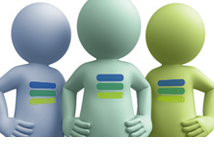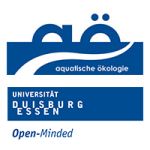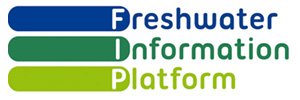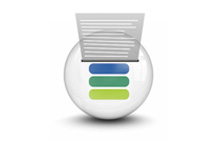FIP principles
Founding partners & contact

The founding institutes & contact to the team
How to contribute
Supporters & Contributors
The Freshwater Information Platform evolved from the Global Freshwater Biodiversity Information Platform, generated within the EU funded BioFresh project. Four institutes from BioFresh decided to continue with the idea of bringing together information and data on freshwater research in a clearly arranged and easily explorable way. These partners have a commitment to further maintain the FIP and commonly form the editorial team. We highly welcome contributions from other institutes/projects and we invite all scientists to present ideas, add data, maps or other information to the platform.
If you want to become a supporter/contributor or associate of the FIP contact us at
info@freshwaterplatform.eu.

University of Natural Resources and Life Sciences, Institute of Hydrobiology and Aquatic Ecosystem Management (BOKU), Vienna - Austria
The Institute of Hydrobiology and Aquatic Ecosystem Management (IHG) at the University of Natural Resources and Life Sciences (BOKU) is one of six institutes within the Department of Water, Atmosphere and Environment (WAU).
IHG is an interdisciplinary group of aquatic ecologists, landscape ecologists, river engineers and historians organised in seven groups: Benthic Ecology and Ecological Status Assessment, Hydrobiology and Aquaculture, Fish Ecology, River Landscapes and Aquatic Ecosystem Management, Biogeochemistry in Aquatic Ecosystems, Aquatic Ecosystem Analysis and Modeling, International Training Programmes in Limnology. The staff includes six permanent scientists, 30 PhD candidates and post-docs, and three technical and administrative staff members.
The key areas of research at IHG deal with the functions, processes, and structures of freshwater ecosystems and their environments, including assessment, restoration and climate change impacts. Research and training focus, for example, on hydro-morphological dynamics, nutrient cycles, food chains, habitat demands, biotic interactions or multiple stressors. Further working fields include, among others, aquaculture and fishery as well as taxonomy and ecology of benthic invertebrates.
Institute of Hydrobiology and Aquatic Ecosystem Management
Contact: Astrid Schmidt-Kloiber

Aquatic Ecology, Universität Duisburg-Essen (UDE), Essen - Germany
The Workgroup Aquatic Ecology at the University of Duisburg/Essen (UDE) is member of the Centre for Water and Environmental Research (ZWU), which brings together experts form different disciplines working in the field of water and environmental research (covering water chemistry, hydraulic engineering, hydrology and ecology). The Aquatic Ecology employs around 35 scientists (full professor, post-docs, PhD students, scientists).
The group around Prof. Daniel Hering covers expertise including river assessment and restoration, ecotoxicology, climate change impacts on freshwater ecosystems and aquatic parasitology. It has played a key role in the Europe-wide development of WFD-compliant assessment systems for rivers and is currently dealing with mutiple stressor effects on rivers, lakes and estuaries.
The team has developed the assessment system Perlodes, which is based on benthic invertebrates, and is applied for assessing rivers in Germany. Projects on assessment and restoration are funded by the German Federal Environment Agency, the Working Group of Federal States on Water Problems, and – in particular – the European Union. Three EU-funded projects were coordinated by the group:
AQEM, WISER and MARS (see projects).
Contact: Daniel Hering, Jörg Strackbein

Royal Belgian Institute of Natural Sciences, Brussels - Belgium
The Royal Belgian Institute of Natural Sciences (RBINS) has a long (more than 150 years) and outstanding track record of integrated investigations in different biogeographical regions. The main expertise of its more than 100 pre- and post-doctoral researchers (40 permanent scientific staff) lies in animal taxonomy and evolution, biodiversity as well as ecology. The Freshwater Biology group’s research focuses on evolutionary ecology of freshwater meiobenthic organisms and has extensive expertise in evolutionary and limnological work on meiobenthos.
The group closely collaborates with the Belgian Biodiversity Platform (BBPF), which ensures the hosting of the Freshwater Biodiversity Data Portal and offers support in terms of IT and networking expertise. The Belgian Biodiversity Platform is a distributed biodiversity information and communication initiative by the Belgian Science Policy (BelSPO). It serves as Belgian node to the Global Biodiversity Information Facility (GBIF), the European Platform on Biodiversity Science Policy (EPBRS), and is involved in the ERA-net BiodivERsA. It develops a database on Belgian biodiversity research resources and coordinates the Freshwater Animal Diversity Assessment (FADA). The BBPF also implements SCAR-MarBIN, the Antarctic marine biodiversity portal of the Scientific Committee on Antarctic Research.
Royal Belgian Institute of Natural Sciences (RBINS)
Contact: Koen Martens, Aaike De Wever

The Leibniz-Institute of Freshwater Ecology and Inland Fisheries (IGB), Berlin - Germany
The Leibniz-Institute of Freshwater Ecology and Inland Fisheries (IGB) is an independent and interdisciplinary research institute dedicated to the creation, dissemination, and application of knowledge about freshwater ecosystems. Working in close partnership with the scientific community, government agencies, as well as the private sector, guarantees the development of innovative solutions to the most pressing challenges facing freshwater ecosystems and human societies.
IGB is part of the Forschungsverbund Berlin e.V. and member of the Leibniz Association. Currently, over 220 people are employed at IGB including more than 80 scientists, 60 doctoral students, 80 non-academic staff members, and four apprentices. Scientists at IGB cover a wide range of disciplines, from hydraulics to socioeconomics, from molecular biology to catchment modelling, and from microbial ecology to fish behavior integrating knowledge on freshwater biodiversity, freshwater boundaries and linkages, and on human-ecosystem interactions. It furthermore runs unique long-term monitoring and research programs at Lakes Mueggel and Stechlin, and the Spree and Tagliamento Rivers pivotal for understanding and predicting global change impacts on freshwater ecosystems.
Leibniz-Institute of Freshwater Ecology and Inland Fisheries (IGB)
Contact: Sonja Jähnig, Vanessa Bremerich



